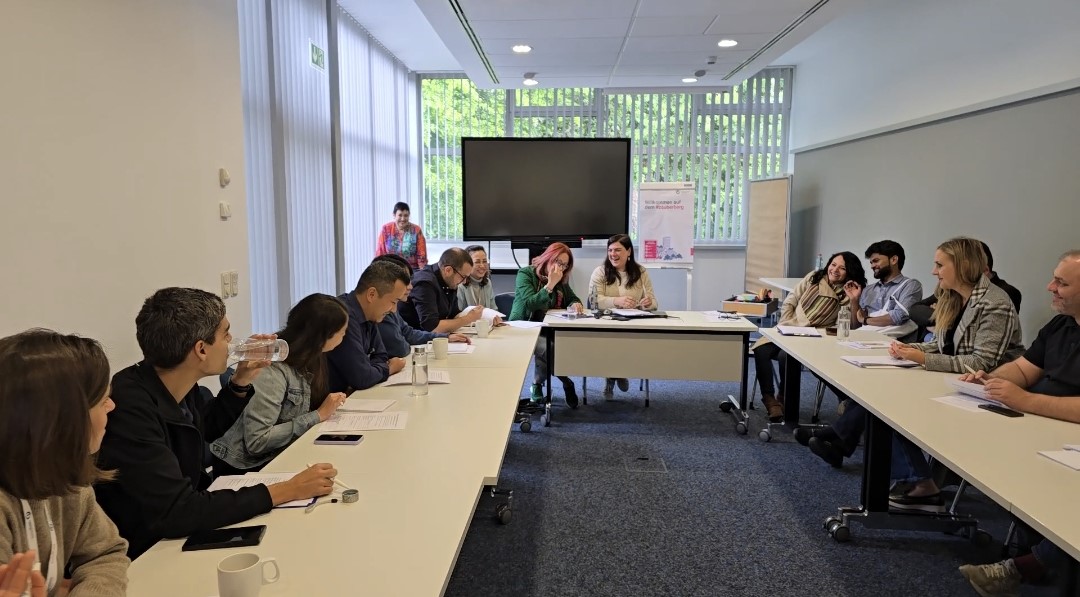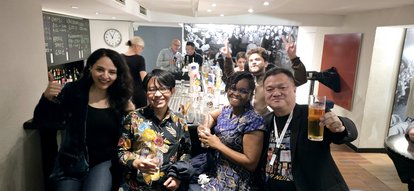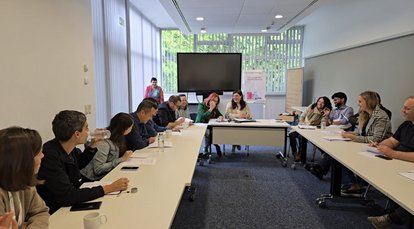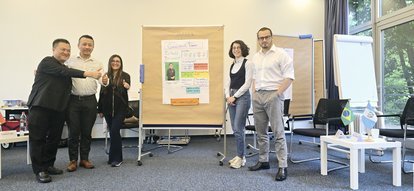IAF
Learning about Coalition Building in Gummersbach

Three groups role-playing in negotiation and coalition-building: green youth group (left), NGO (middle) and liberal party (right)
© Chin-Huat WongTo Gummersbach and Beyond
Gummersbach, a small town with about 50,000 residents, and about 54 kilometres away from Cologne Airport was unknown to most of us, the 23 participants in the seven-day “Coalition Building and Strategic Partnerships” workshop on 18-25 May 2025 (Sunday to Sunday).
We were housed in the quiet International Academy of Leadership (IAF) located on a small hill, about 5-minutes bus ride from the Gummersbach town. Named after the late Theodor Heuss, the first president of West Germany, we learned that this small town was chosen by Free Democratic Party (FDP) parliamentarians who wanted a place for training and retreat for the party’s think tank wing Friedrich Naumann Stiftung (FNS) that was too far away from the Bonn-Bundeshaus, the then parliament house in Bonn.
Just 62 kilometers away, the scenic but sleepy Gummersbach made perfect choices. Besides the hall and several rooms named after liberal leaders and thinkers like Ralf Dahrendorf, Karl Popper and Hannah Arendt in the white main building, the Academy has also en suite rooms in the adjacent black tower, to house participants from within Germany and all over the world. It has a wonderful cafeteria that feeds participants and guests for three meals, a coffee corner that provides free flows of coffee at any day of the time, and a bar that opens at night, where every participant is given a free token for every night to exchange for a drink. The IAF is run by an enthusiastic and efficient team led by Bettina Solinger (director) who would welcome all guests with her broad smiles, with assistance by Lena Herrmann (coordinator). For most nights, when we wanted to let our hair down, sometime into singing and dancing, the cheerful Daniel Szykowny from Poland would be manning the bar.

Fun time in the bar, last evening before departure
© Chin-Huat WongWe came from 21 countries/national community from four continents: Africa (Ivory Coast, Morocco, South Africa, Tunisia), Asia (India, Indonesia, Lebanon, Malaysia, Taiwan, Thailand, Tibet, Turkey), Europe (Armenia, Georgia, Poland) and Latin America (Brazil, Chile, Costa Rica, Ecuador, Guatemala, Mexico). Amongst us were politicians including current and former lawmakers, civil society activists, academics, think-tankers, and a technocrat.
Thanks to the recommendation and support from FNS Malaysia and its programme manager, Vera Jasini Putri, I was chosen to join this privileged group to learn from each other as well as our experienced and dedicated facilitators: Rainer Heufers and Penny Tainton, assisted by Jannik Glatz, a university student under FNS scholarship whose long blonde hairs tied into a pony tail made him look like the elf prince Legolas who just took a break from the Council of Elrond in Rivendell (from the movie ‘Lord of the Rings’).
Old Friends and New
Rainer is an old friend whom I have known for about two decades, when he was the country director for FNS Jakarta overseeing Malaysia. He spent a quarter of century in Asia and founded an Indonesian think tank, Center for Indonesian Policy Studies (CIPS) in 2015, before his recent return to Germany. Before going into consultancy, Penny was a politician in South Africa’s main opposition party the Democratic Alliance (DA). She was central in the design of systems and processes for post-election coalition negotiations to help DA Mayors to govern in their new term. Both had started their planning of this workshop since last year, curating a well-designed programme for learning from both experts and peers.
On Tuesday morning, we listened to the sharing by Torsten Herbst and Sietse Wijnsma. An FDP member in the last Bundestag, Mr Herbst is a member of the party’s Federal Executive Committee. He candidly shared with us the insider’s stories on how German parties negotiated in government formation and how the Traffic Light (CDU-CSU-FDP-Green) Government collapsed last November. Mr Wijnsma runs the unit on parliamentary work, in the ALDE/Renew Europe Group (the cross-national liberal caucus) in the European Parliament. We learned how the complex supra-governmental system of the EU operated, and various compromises and coordination that the parties and Member of European Parliaments (MEP) need to make.
On Wednesday afternoon, we visited the beautiful ancient city of Cologne and, before our city excursion, listened to the sharing of different partnership experiences in liberal civil society groups and think tanks, from Aneta Vaine and Alexander Hammond. As the Director of the Initiative for African Trade and Prosperity (IATP), Mr Hammond shared his experiences in coalition building with Think Tanks in Africa.
Ms Vaine is the vice president of the Lithuanian Free Market Institute, and her group embarked on two very intriguing projects amongst many. One is a school syllabus on economics called “Economics in 31 hours” where the liberal bias is consciously avoided so that it could be accepted by different quarters. Beyond Lithuania, the text is used in Ukraine, Slovakia, Uganda, and Georgia. The other project is an inter-disciplinary quest into the question of scarcity – a core concept from economics which might be called in other contexts as deficiency, deprivation, shortage, imperfection, limitation or insecurity – and its link to morality and public policy. Beyond economics, it engages with views from philosophy, theology, anthropology, psychology and sociology. The first project underlines the Institute’s effort to be inclusive in intellectual approach so that a common language and framework may be attained in shaping the young generation. The second project shows a deep respect for other disciplines and realms (like religion) when free market liberalism is often reduced to economic gains and instrumentality by their advocates in some countries.
Coalition Building and Strategic Partnership

Group presentation in the Dahrendorf Room where most sessions took place.
© Thupten RinzinOur days normally started with some ‘awakening’ exercise. For example, we were asked to pick up a paper card from dozens of them lying on the floor, each paper card would be written with a word or phrase like ‘resilience’ or ‘accepting’, and we would have to explain briefly the meaning of such word, for us, to everyone. Since everyone had to speak, we had to listen to each other, making it impossible for anyone to have their mind wonders away.
We had four sessions a day, 1.5 hours each, with generous lunch break of two hours and two tea breaks of half an hour. Almost every session was interactive, which we were divided into several break-out groups – group membership varied every day – with tasks to complete. Sometimes, groups were given a serious topic to discuss. More often, groups were given tasks to solve, sometimes in competition with other groups.

Three groups role-playing in negotiation and coalition-building: green youth group (left), NGO (middle) and liberal party (right)
© Chin-Huat WongIn two of the tasks, everyone in a group was instructed to role play as certain actor, mimicking the real-life scenarios. In one scenario, a youth green group, a NGO and a liberal party in a negotiation over electoral promises on introducing electric buses. In the other scenario, anti-censorship journalists, anti-cyberbully parent groups, privacy and security advocates, politicians, in a negotiation on a digital right manifesto.
We had to form coalitions at two levels. First, within each group, to decide on the positions to be taken by the respective assigned role (For example, what position would a radical youth green group take in negotiation with the liberal party which had to balance responses from various sectors of the electorate?) Second, between groups, to act out the tensions emerging and compromises reached between different actors. We all enjoyed very much the role-playing parts in the second level. However, it was hard to carry out the first-level discussions effectively and efficiently within a limited time.
As seasoned politicians and activists, many of us had a lot of ideas and are often more eager to speak than to listen. In the above two tasks as in many others, groups often went straight into discussing the topic, rather than first agreeing on how to plan and structure the discussion. This made it somewhat challenging to consolidate opinions later for plenary reporting or inter-group role-playing. I could imagine a real-life scenario of policy-negotiation in a very early stage: a townhall meeting went unfocused and disorganised because the process of coalition-building has just started, and many floor speakers have yet to know each other.

Group presentation on slum renewal plan. My friends in another group made me their Mayor Chin in their Gummersbach Times bulletin.
© Chin-Huat WongWhat did I learn about coalition building and strategic partnership through tasks and games in the six-day programme? First, what do we want from a coalition/partnership we join or build? What can we offer to the coalition/partnership? Analysing our gifts and gains would help us to define our strategic goals and decide who to invite to this table. This is more useful than to start a coalition in the wrong footing and wait for tide to change. Second, what are core values we uphold? What are the values we oppose? The latter would help us to know our red lines and when to walk away. Third, what is our “Best Alternative to a Negotiated Agreement” (BATNA)? What is our “Worst Alternative to a Negotiated Agreement” (WATNA)? What is our “walk away price (WAP)? These are negotiation terms taught to us by Penny, who recommended the Harvard short term programme.
From fellow participants, we learned about what critical events that might happen in their respective country or national community, whether it was the significant second round Polish presidential election, the Georgian government’s arrest of opposition leaders, or the pressure from China on Taiwan for reunification. As we bid each other farewell in the second Saturday, several of us formed a new WhatsApp group titled ‘against populism’, consisting of Nicola and Jacqui (South Africa), Hugo (Guatemala), Tengo (Georgia), Hamid (India), Jannik (Germany) and me.
For an outsider like me, the wonderful IAF is the German political soft power on display. With the exception of the Alternative for Germany (AfD), German parties that gain representation in its Bundestag (Parliament) will get some funding to set up their think tank and training centres like IAF. Hence, most of our costs were covered by generosity of the German people. Danke schoen!
Editor: Dhea Ramadhani (Program Assistant & Communications Officer, FNF Malaysia)
